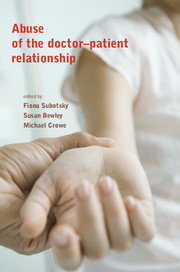Book contents
- Frontmatter
- Contents
- List of figures, tables and boxes
- List of contributors
- Foreword
- Introduction: mapping the territory
- 1 The ethical importance of boundaries to intimacy
- 2 The patient's perspective: impact and treatment
- 3 Teaching ethics and ethical behaviour to medical students
- 4 With the benefit of hindsight: lessons from history
- 5 The prevalence of boundary violations between mental health professionals and their clients
- 6 Psychiatry: responding to the Kerr/Haslam Inquiry
- 7 The general practitioner and abuse in primary care
- 8 Boundaries and boundary violations in psychotherapy
- 9 Sexual therapies: ethical guidelines, vulnerabilities and boundaries
- 10 Obstetrics and gynaecology: a special case?
- 11 Nurses as abusers: a career perspective
- 12 Medical management: governance and sexual boundary issues
- 13 Dealing with offending doctors: sanctions and remediation
- 14 Defending doctors: the protection society's experience
- 15 Regulation and its capacity to minimise abuse by professionals
- 16 The role of the General Medical Council
- Appendix 1 Extract from Vulnerable Patients, Safe Doctors
- Appendix 2 Codes of ethics of psychiatric associations in other countries
- Appendix 3 Guidance from the Council for Healthcare Regulatory Excellence
- Appendix 4 Examples of determinations by the General Medical Council's Fitness to Practise panels
- Appendix 5 Website resources and information
- Index
- Plate section
13 - Dealing with offending doctors: sanctions and remediation
Published online by Cambridge University Press: 02 January 2018
- Frontmatter
- Contents
- List of figures, tables and boxes
- List of contributors
- Foreword
- Introduction: mapping the territory
- 1 The ethical importance of boundaries to intimacy
- 2 The patient's perspective: impact and treatment
- 3 Teaching ethics and ethical behaviour to medical students
- 4 With the benefit of hindsight: lessons from history
- 5 The prevalence of boundary violations between mental health professionals and their clients
- 6 Psychiatry: responding to the Kerr/Haslam Inquiry
- 7 The general practitioner and abuse in primary care
- 8 Boundaries and boundary violations in psychotherapy
- 9 Sexual therapies: ethical guidelines, vulnerabilities and boundaries
- 10 Obstetrics and gynaecology: a special case?
- 11 Nurses as abusers: a career perspective
- 12 Medical management: governance and sexual boundary issues
- 13 Dealing with offending doctors: sanctions and remediation
- 14 Defending doctors: the protection society's experience
- 15 Regulation and its capacity to minimise abuse by professionals
- 16 The role of the General Medical Council
- Appendix 1 Extract from Vulnerable Patients, Safe Doctors
- Appendix 2 Codes of ethics of psychiatric associations in other countries
- Appendix 3 Guidance from the Council for Healthcare Regulatory Excellence
- Appendix 4 Examples of determinations by the General Medical Council's Fitness to Practise panels
- Appendix 5 Website resources and information
- Index
- Plate section
Summary
Introduction
Being a doctor does not make a person a law-abiding model citizen. Doctors commit offences outside of professional practice, including sexual offences. Male (and, less frequently, female) doctors do so for similar reasons to others in society, and this should not be surprising.
A second group of doctors behaves in a sexually inappropriate manner with patients. The data from North America (Gartrell et al, 1986; Morrison & Wickersham, 1998; Bloom et al, 1999) and Australia (Quadrio, 1996) suggest that 3–10% of doctors admit to some form of sexual involvement with a patient. For each doctor there may be a number of patient victims. For example, it was estimated that around 70 women claimed to have been sexually assaulted by the consultant psychiatrist William Kerr (see Box 6.2, p. 66).
Gabbard (1999) has proposed a psychodynamic categorisation for doctors who behave inappropriately in a sexual manner and/or who offend. Evidence received by the Kerr/Haslam Inquiry (Department of Health, 2005) suggested that for doctors or therapists who sexually abuse patients, the most common type is the ‘predatory psychopath’ (see also Box 8.4, p. 99). Abel & Osborn (1999), in a North American study of cases of professional misconduct, found that 20% of the sample had a paraphilia (sexual deviation) which extended into their professional practice. A simpler method of categorisation (see Box 13.1) is to consider where the sexual misconduct/offending takes place, and with whom, as this helps in decisions on sanctions and the feasibility of remediation (Box 13.2).
Whatever the subtype, and however the misconduct itself is dealt with, the nature of these worrying misbehaviours means that there will be always be concern about future risks to patients. The guiding principle in the handling of sexual misconduct and offending is that patient safety must be paramount, not the professional career of the practitioner.
For each doctor, sexual misconduct and offending may result in one or all of the following:
• criminal sanctions
• employment sanctions
• regulatory sanctions.
- Type
- Chapter
- Information
- Abuse of the Doctor-Patient Relationship , pp. 151 - 163Publisher: Royal College of PsychiatristsPrint publication year: 2010



